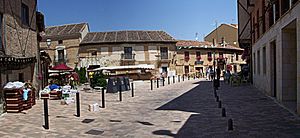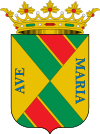Saldaña, Palencia facts for kids
Quick facts for kids
Saldaña
|
|||
|---|---|---|---|
 |
|||
|
|||
| Country | |||
| Autonomous community | |||
| Province | |||
| Municipality | Saldaña | ||
| Area | |||
| • Total | 131.95 km2 (50.95 sq mi) | ||
| Population
(2018)
|
|||
| • Total | 3,004 | ||
| • Density | 22.766/km2 (58.964/sq mi) | ||
| Time zone | UTC+1 (CET) | ||
| • Summer (DST) | UTC+2 (CEST) | ||
Saldaña is a town and municipality in the province of Palencia in Spain. It is located in the region of Castile and León. This old town might be the "Eldana" mentioned by the ancient historian Ptolemy. He wrote that the Roman Empire conquered a town with that name.
Saldaña is built right next to the River Carrión.
Roman History
You can still see parts of a beautiful old Roman house, called a villa, in Saldaña. People believe this villa once belonged to the Roman emperor Theodosius I. This shows how important Saldaña was during the Roman Era.
Medieval Times
From the 900s to the 1000s, Saldaña was home to a powerful family of counts called the Banu Gómez. These medieval counts are famous in local stories and books. They even appear in tales about a hero named Bernardo del Carpio. In another famous Spanish story, Cantar de Mio Cid, their descendants, the Infantes de Carrión, are rivals to the main hero.
In 1149, a queen named Berenguela of Barcelona passed away in Saldaña.
Saldaña Today
Saldaña is well-known for its lively open-air market. This market happens every Tuesday in the town's main square.
The Old Town Square
The town has an old stone square called the "Plaza Vieja." People think this square dates back to the 900s. In September 2019, work began to fix the square's pavement. This project will make it safer for people walking and easier for those with disabilities to use. After the renovation, cars will not be allowed in the square.
Images for kids
-
Visigothic coin of the king Witteric minted in Saldaña
See also
 In Spanish: Saldaña para niños
In Spanish: Saldaña para niños
 | Audre Lorde |
 | John Berry Meachum |
 | Ferdinand Lee Barnett |






